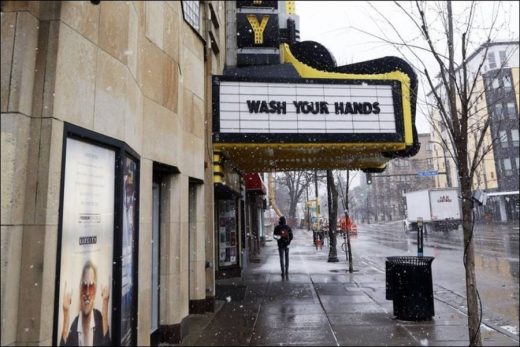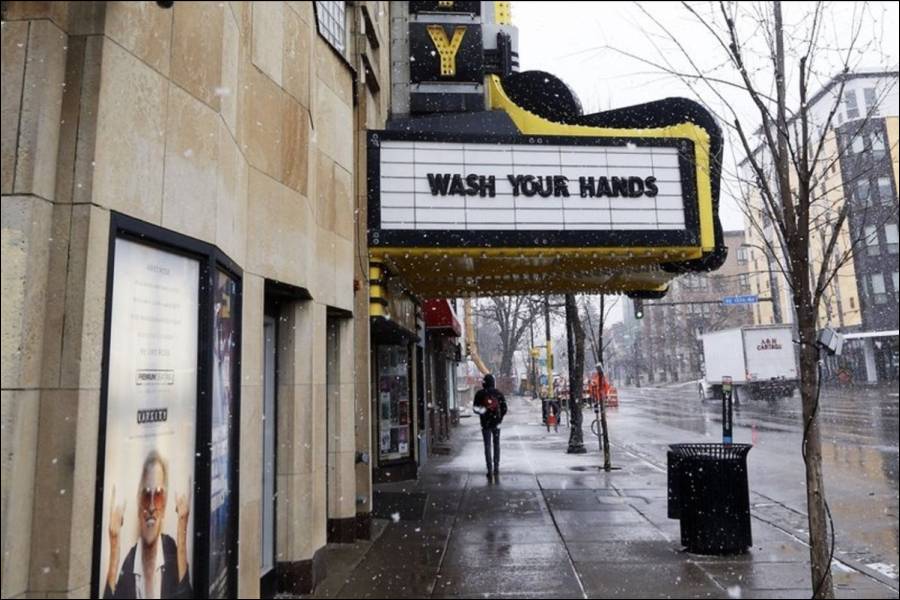As cinemas shutter for the foreseeable future across the U.S. and Europe in a historically unprecedented wave of closures to lower risks of exposure to coronavirus, a handful of cinemas in China have already re-opened and all signs indicate that many more will soon follow in their wake.
“Our cinema is preparing to re-open, but we haven’t been formally told when exactly we can officially resume,” said Yang Yang, programmer at the Broadway Cinematheque in central Beijing. “It’s unlikely a nation-wide directive to re-open will come down from the film bureau, because every province and region is at a different stage of epidemic prevention, so the requirements for re-opening will vary. It’s more likely that over a period of time, cinemas will slowly, progressively re-open.”
On Monday, the pandemic reached a possible turning point: both the total number of people who have died from coronavirus and the total number of confirmed cases outside of China came to surpass the tally of deaths and cases inside.
Amidst the virus’s continued spread beyond China’s borders, a handful of Chinese cinemas are already experimenting with soft re-openings. At least one cinema in the far western province of Xinjiang, where there have been no new coronavirus cases for 27 consecutive days, attempted to re-open its doors Monday. By Wednesday, at least 17 cinemas across China had resumed operations, according to ticketing data resource Maoyan. The vast majority were in Xinjiang, while others were in Qinghai or Fujian provinces.
Business, however, has been extremely thin. The most successful cinema of the bunch, located in Xinjiang’s capital city Urumqi, sold just 371 tickets at RMB30 ($4.26) a pop Wednesday. Six others sold literally just one or two tickets apiece.
These establishments obviously will have trouble making back even their most basic daily expenditures, wrote Chinese outlet Southern Weekend, stating: “It is undeniable that the significance of cinemas resuming work after suspending business for weeks is not whether they’re profitable in the short-term, but whether they can generate new confidence in the industry.”
Cinemas in Urumqi are selling tickets online for pairs of seats spaced far apart from any other occupied places in the theaters to help people continue with social distancing. They’ve also advertised special promotions to entice reluctant viewers, such as deals for a free film with the purchase of two popcorns, or five films to binge watch in a single day with a RMB300 ($42.60) top-up of a membership card.
It would appear that China is still figuring out how to solve the challenge of distributing films to cinemas opening up sporadically in accordance with local coronavirus conditions, rather than simultaneously nationwide, and at a time when no new films have scheduled release dates in the pipeline.
The handful of cinemas currently open have only been able to play old titles already in their possession, with a few of them playing a single, second-run film all day long — making it hard to bring in skittish movie-goers only just emerging from their quarantine cocoons. The Meiya Big Screen Cinemas in Urumqi, for example, has just been screening the the December thriller “Sheep Without a Shepherd” on repeat, while the Pacific Cinema in Gansu province is even worse off, with nothing to play but the saccharine romantic comedy “Blue Pleated Skirt,” which only made $4,000 in its initial month-long run.
Despite these troubles, it would appear that more cinemas will soon come out of the woodwork. Regions currently less affected by the coronavirus around the country have issued statements that cinemas and other entertainment venues like Internet cafes, karaoke venues and bathhouses can reopen as long as they apply to and receive approval from the local government, and then strictly follow health procedures.
The second-tier city of Yantai in Shandong province, with a population greater than Denmark, was one of the earlier ones to make such a pronouncement, issuing such a statement on March 10. Three days later, areas as far-apart as rural Dehong prefecture on the border with Burma and first-tier city of Nanjing in coastal Jiangsu province said the same.
On Monday, authorities in first-tier Qingdao city said that cultural venues such as libraries, museums and cinemas would “open very soon,” while on Tuesday, officials in southwestern Sichuan said that the same would hold true there, given that there had been no new confirmed cases in their province in the past two weeks.
Wang Yan, the director of marketing at Sichuan’s Pacific Cinemas, told a local state-run news outlet that it is currently preparing for re-openings by disinfecting facilities and making sure venues have masks, hand sanitizer, temperature checks and even an emergency quarantine isolation room available for movie-goers once they start coming back.
Meanwhile, things could soon be moving as well in the nation’s biggest metropolises, with one top theatrical exhibition insider telling Variety he was confident that screens in Shanghai would see soft openings soon.
In Beijing, a cinema employee said his establishment had been told by Chinese distributor Huaxia to send its hard drives back so that it could receive a film to screen beginning in April, but was not told which one.
Yet for the time being, theaters in most big cities still have their business on ice. Several theaters in Guangzhou interviewed by Southern Weekend said they had not yet received any go-ahead to resume working. Such decisions are “subject to the notice from the film bureau,” explained one cinema employee. He added, however, that they had heard cinemas would re-open with a mix of “classics, epics and serial blockbusters.”
“The days of the hardcore movie fans are coming.”
Views: 273








